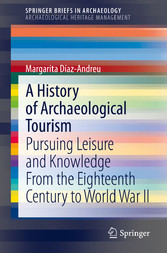Suchen und Finden
Service

A History of Archaeological Tourism - Pursuing leisure and knowledge from the eighteenth century to World War II
Margarita Díaz-Andreu
Verlag Springer-Verlag, 2020
ISBN 9783030320775 , 122 Seiten
Format PDF
Kopierschutz Wasserzeichen
Geräte
Mehr zum Inhalt

A History of Archaeological Tourism - Pursuing leisure and knowledge from the eighteenth century to World War II
This book examines the relationship between archaeological tourism and professional archaeology. It will do so by looking at this connection - most visibly through nationalism and global capitalism - from the its origins in the early modern period until World ar II. How separate is the development of archaeological tourism from that of the formation of archaeology as a discipline? And do the fields operate in two different worlds? Scholarly discussions have largely treated them as distinct fields with no connection. Histories of archaeology, in particular, have focused their attention on aspects such as the history of archaeological discoveries, archaeological thought and, more recently, the political relationship between archaeology and nationalism and other ideologies. Largely missing from all these accounts has been an examination of how archaeology has been inserted into society, for example through something that all humans enjoy - leisure - in the form of archaeological tourism. Moreover, just as histories of archaeology have largely ignored the connection between archaeology and tourism so, too has tourism in the reverse direction. Recent studies on tourism have centered on topics such as economy (sustainable and recession tourism) and new types of tourism (including ecotourism and medical tourism).?
Margarita Díaz-Andreu is an ICREA Research Professor based at the University of Barcelona (UB). She is the PI of the Group of Public Archaeology and Heritage (www.gapp.cat) at her university and has led several projects as PI such as the Spanish team of the EU-funded project 'Heritage Values Network' project. Her areas of research are the history of archaeological heritage, archaeological tourism, migration and the politics of heritage. She is interested in public archaeology and community heritage from different perspectives: cultural tourism, world heritage, citizen participation, immigration and the conservation of cultural goods. She and her team are currently prioritizing projects related to heritage from a social perspective, addressing the problems of today's society. Her research group has as one of its priorities the development of new methodologies in social heritage, including some in-depth research on focus groups. She is also encouraging participative projects that give voice to society and serve as a bridge between society, academia and the institutions dealing with the management of archaeological heritage. The author of A World History of Nineteenth-Century Archaeology (OUP, 2007), her first thoughts on the history of archaeological tourism were written in 2004. Since then she has published a special issue on archaeological tourism in the International Journal of Historical Archaeology (2013) and several articles on this topic.
Shop

